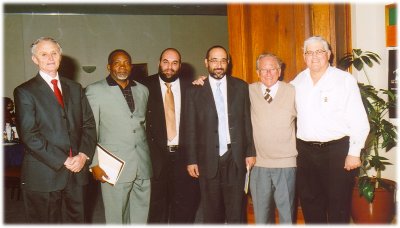|
11th African Jewish Congress Meeting and resounding success
A large contingent of delegates from both Sub-Saharan African countries and the Commonwealth were in attendance at the 11th African Jewish Congress meeting , which took place at Beyachad on Monday 29 August 2005, under the auspices of the SAJBD. Representatives from Botswana, Lesotho, Swaziland, Namibia, Zimbabwe and Kenya took part in the deliberations, giving report-backs on developments in their respective countries. Reports on behalf of Mauritius, Mozambique and Madagascar were given by AJC Spiritual Leader Rabbi Moshe Silberhaft while AJC President Mervyn Smith reported briefly on behalf of Zambia.
Israeli Charge D'Affaires Ilan Fluss and Commonwealth Jewish Council President Lord Greville Janner brought greetings and Chief Rabbi Goldstein was guest speaker at the luncheon afterwards.
The ongoing crisis in Zimbabwe, to which a separate session was devoted, was one of the main items of discussion. Peter Sternberg, President of the Zimbabwe Jewish Board of Deputies, said that Zimbabwe's aged Jewish community now numbered only about 300 and was destined to decline still further. Somehow, the community was still able to maintain its main communal organisations, including three shuls and the Jewish aged home in Bulawayo.
Much discussion took place on whether the South African Jewish community should openly condemn human rights abuses taking place in Zimbabwe. Many delegates were strongly of the opinion that Jews had a moral duty to do so, although Sternberg expressed scepticism as to the efficacy of such statements. Also discussed was Mugabe's statement earlier this year on SATV that Zimbabwe's economic decline was in part due to the Jews leaving. Sternberg said that his Board had decided not to register any protest against this since this would not have achieved anything and in any case hardly anyone in Zimbabwe would have heard of it. So far as the future went, Sternberg said despite the stalking famine and deep anti-Mugabe feeling in the cities, he did not anticipate any violent popular uprising. The attitude of the population was one of: "Without food we will die. Tell us where we can lie down and die", in other words of cowed resignation.
The main focus of the reports by the various delegates was how their small Jewish communities are coping in the face of diminishing numbers and geographical isolation and the role of the AJC in facilitating the maintenance of Jewish life in those localities. With the exception of Botswana and Mauritius, all the communities represented are diminishing.
Nairobi Rosh Kehilla Dr Vera Somen described Kenyan Jewry "a small community with a very big heart". The highlight of the previous year had been the centenary of the Nairobi Hebrew Congregation, which was celebrated in style in 2004. About 180 Jews today live in Kenya, mainly in the capital Nairobi. Only a minority of these are permanent residents, the majority being Israelis temporarily based in the country.
Both Richard Lyons (Botswana) and Harold Pukewitz (Namibia) spoke positively about their respective countries, emphasising that their government and judiciary was established on a sound democratic basis. Namibian Jewry, which comprised some 120 families during the 1960s, now has only ten families and a few individuals, nearly all located in the capital, Windhoek. Botswana Jewry, by contrast, has shown modest but steady growth over the past decade. Also growing is the Jewish community in Mauritius, which this year celebrated the opening of the first shul and Jewish communal centre on the island.
There is no organised Jewish life in Mozambique, although the synagogue, after years of being used as a warehouse, was formally returned to the tiny Jewish community in 1989. The historic building, which was opened by Chief Rabbi Landau from Johannesburg in 1926, is today seriously in need of renovation.
Geoffrey Ramokgadi, a former South African businessman based in Mbabane, and Chaim & Sima Torgeman continue to run the affairs of the Swaziland community.
Lesotho was represented by long-time resident Yehuda Danziger, one of only three identified Jews currently living in the country.
Anti-Semitism rarely, if ever, surfaces in the AJC countries and even attitudes towards Israel were reported as being generally fairly positive. In part, this is due to the fact that a number of their citizens have received training in agriculture, hydrology and other essential skills as part of Israel's upliftment programmes on behalf of developing nations. Active Israel Friendship organisations exist in both Mauritius and Madagascar.
Mervyn Smith was unanimously re-elected as president of the AJC. Vera Somen of Kenya was elected as vice president and newly elected committee members are Abe Baron – SAJBD Cape Council, Irene Zuckerman - chairperson Africa Region – International Council of Jewish Women, & Nilly Baruch – Cape, Union of Jewish Women. |
||
|

